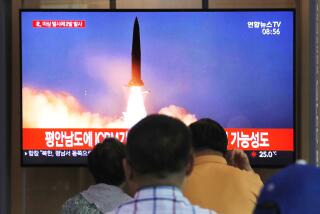Kashmir Could Cause a U.S.-Pakistan Breakup
- Share via
The ongoing conflict in Kashmir is intimately linked to the terrorist threat against the United States. Having caused two wars between nuclear powers India and Pakistan, Kashmir is poised to cause a serious split between those two essential U.S. partners in the coalition against terrorism.
Pakistan would like to say that the fight against terrorism has nothing to do with Kashmir. Some groups attacking India from Pakistan are indeed disaffected Indian Kashmiris in armed rebellion against local misgovernment and human rights abuses. But an increasing number are foreigners who share expertise, personnel, resources, ideology--and global objectives--with groups spanning Afghanistan and Pakistan.
Pakistan’s armed forces have found cross-border terrorism into India to be a strategic equalizer with India. Pakistani public opinion feels solidarity with largely Muslim Kashmir. Yet Pakistan must decide. We cannot tolerate policies from an ally that are contrary to our anti-terrorism goals.
The groups that threaten the United States cannot be dismantled unless Pakistan ceases to support armed infiltration into Kashmir. India, meanwhile, must act more justly and with less violence and seek a political settlement that answers Kashmiri grievances.
In Indian-occupied Kashmir, the U.S. has urged restraint by the Indian government to cut off popular support for extremism. Before, these U.S. requests had little effect. Now, India may heed us for fear that the current crisis could incline us toward its archenemy Pakistan.
The most important principle for U.S. policy on Kashmir should be to defer final resolution of sovereignty issues. No Indian government will accept lessening of Indian sovereignty in Kashmir. Thus, we must insist on an end to Pakistani support for the terrorism there. No settlement will be acceptable to Pakistan that fails to vindicate its role as champion of the rights of Kashmir’s Muslims and to provide it with legitimate political presence in the affairs of Kashmir as a whole.
Any settlement must also serve the people of Jammu and Kashmir, as the state is formally known. They seek human and democratic rights, unity between the Indian-and Pakistani-occupied portions of their state and recognition of their special identity--a Muslim majority, but with many Hindus and Buddhists, who form a majority in certain strategic areas.
We should forcefully urge Indian concessions to self-government and push for measures to foster cooperation between the parts of the state occupied by India and Pakistan. Free movement between the two parts is critical but can only come about if the security threat is manageable. Kashmiris, Indians and Pakistanis should be urged to develop approaches to shared interests such as trade, the environment, water, power, tourism and police. The U.S. should provide technical assistance (including monitoring technology and training) to make military and terrorist activity more transparent and development assistance for collaborative projects on the environment, energy, infectious diseases and law enforcement.
With such incremental steps, Kashmiris may prosper by sidestepping anachronistic obsessions with sovereignty. The rest of us, India and Pakistan included, may rest safer from terrorism and nuclear conflict.
More to Read
Sign up for Essential California
The most important California stories and recommendations in your inbox every morning.
You may occasionally receive promotional content from the Los Angeles Times.













